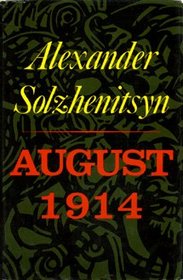|
|
| |
| |
| |
Published
as Avgust chetyrnadtsatogo in Paris in 1971 and translated by Michael
Glenny in 1972: |
| |
| |
| From
Chapter 25 |
|
| |
. .The regiment was fresh; it had been brought
up by rail, there had been no interruptions in its food supply, and it
had suffered practically no casualties during the day’s fighting. The
men were working with a will, as one could tell from the busy, muffled
clink of spades and pickaxes and from the jokes and laughter.
|
| |
| .
.Savitsky had a clear perception of the weaknesses and dangers of
his position. There was no unit to his immediate right, leaving a gap in
the line; furthermore, for this vital sector he had been allotted too little
artillery: a regiment of light field artillery and, almost as a bad joke,
two medium howitzers. The other ten corps howitzers and the complete army
heavy-artillery regiment were far away on the left. Artamonov, however,
had no time to intervene if he was to complete his tour of the positions
that night. Breaking off his conversation with Savitsky and Vorotyntsev,
he ordered a platoon to be paraded in front of him—“that one over there
from the nearest trench, as they are, in working kit.” (After all, he had
once been in charge of the defensive works of Kronstadt!). The platoon put
down its tools, clambered out of the trench, and fell into line without
arms. Artamonov strode along the ranks. |
| |
| .
.“Well, lads—are we going to beat the Germans off?” |
| |
| .
.In a mumbled, ragged chorus the men replied that they would. |
| |
| .
.“Easy job, eh?” |
| |
| .
.They agreed. |
| |
| .
.“Your regiment captured Berlin in 1813, and for that battle honour
you have a set of silver trumpets! You there,” he asked a broad-shouldered
private. “What’s your name?” |
| |
| .
.“Agafon, your ex’ency,” the man replied promptly and smartly. |
| |
| .
.“Which Agafon? When’s your name day?” |
| |
| .
.“The Threshing Floor, your ex’ency,“ answered the soldier, unabashed. |
| |
| .
.“Fool! Threshing Floor indeed! Why threshing floor?” |
| |
| .
.“Because it’s the autumn one, your ex’ency! That’s when we bring
the stooks in from the fields, and start threshing.”* |
| |
| .
.“You fool, you should know all about your saint—who he was and what
he did. And you should pray to him before battle. Have you read the lives
of the saints?” |
| |
| .
.“I, er . . . yes, your ex’ency . . .” |
| |
| .
.“Your saint’s your guardian angel, you see. He keeps you and protects
you. And you don’t know anything about him. When’s the patronal feast in
your village, then? Or don’t you know that either?” |
| |
| .
.“I know it, your ex’ency! It’s around the time of Mary Minor Day.” |
| |
| .
.“And what is Mary Minor Day?” |
| |
| .
.“Agafon faltered, but from behind him came a shout from another
soldier, who from his way of speaking was obviously literate. “The Nativity
of the Most Pure Mother of God, your excellency!” |
| |
| .
.“Well then, pray to the Mother of God while there’s life in you,”
said Artamonov with finality. Bypassing the third man in the rank, he asked
the same question of the fourth soldier, who turned out to be named after
St. Methodius the Quail Hunter† and knew nothing of the life of his saint
either. |
| |
| .
.“But at least you’re all wearing crosses?” |
| |
| .
.“Of course! Every one of us!” Holy Russia answered him as one man,
even sounding offended that he should ask such a question. |
| |
| .
.“Well, then—pray! The enemy will start bombarding us in the morning—so
if I were you, I should pray!” |
| |
| .
.It might have occurred to Vorotyntsev that this performance had
been staged for his benefit, but this was not so: Artamonov always behaved
like that. It was impossible to tell whether he did it out of genuine conviction
or because, having served for so long in the Petersburg Military District,
he knew how much it pleased the grand-duke to see an icon lamp burning in
every soldier’s tent. One learned nothing from his face on these occasions:
his features were a smooth, solid wall, his nose was like a false door handle
which opened nothing, and his eyes were equally blank. |
| |
| .
.Looking up at the sky, he crossed himself. Just as it was his habit
to rush headlong from left to right of his corps, so he crossed himself
with a hurried, sweeping gesture, tapping his forehead and chest and ending
with a violent movement to his left shoulder as though brushing off a gadfly.
Then he made the sign of the cross over Savitsky and embraced him, saying:
“God bless you! God bless your Vyborg regiment!” He might have given the
regiment its full title, though that would scarcely have been appropriate,
since it was “His Imperial and Royal Majesty Wilhelm II, Emperor of Germany
and King of Prussia’s Own Regiment.” The title had now fallen out of use
and a new one had not been devised. |
| |
| |
| |
| |
|
| |
| |


